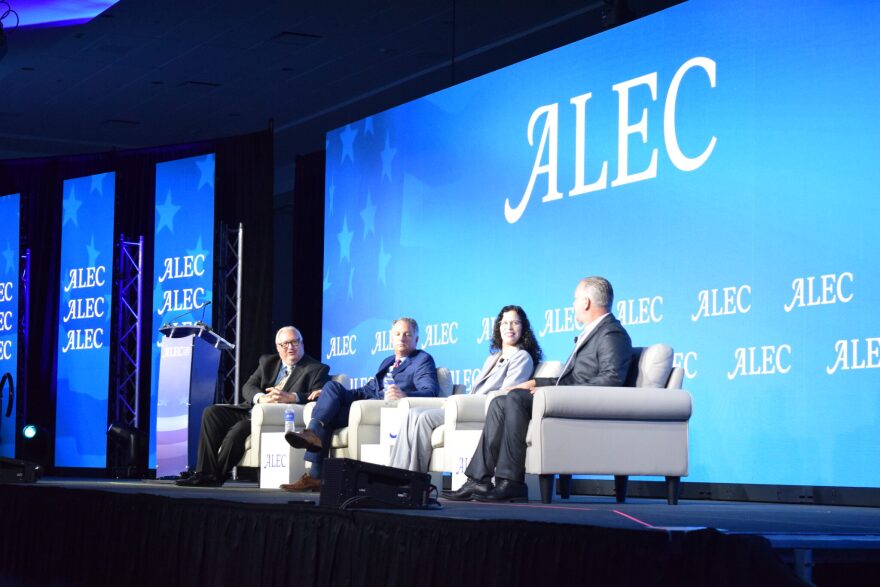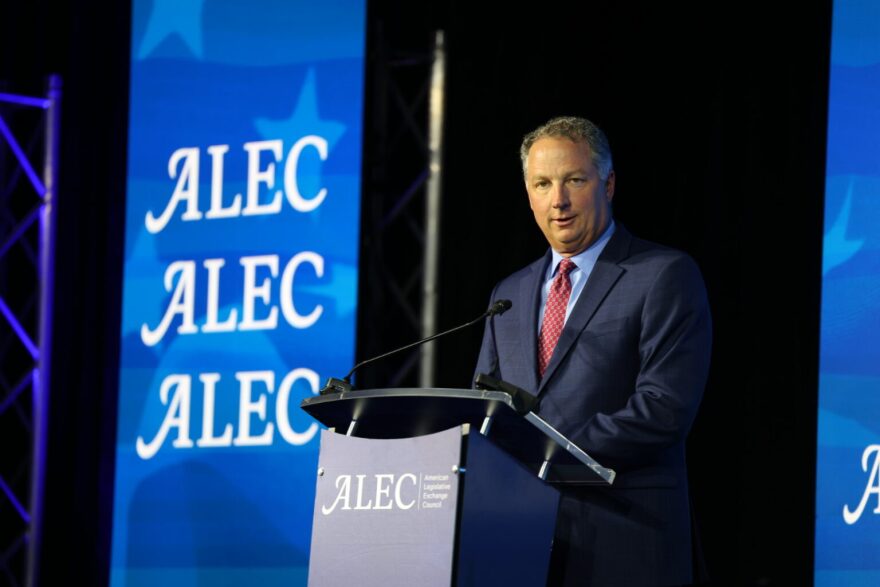Indiana House Speaker Todd Huston framed the state’s universal school voucher system as both a policy success and a model for expanding “educational freedom” across the country while speaking before a national gathering of conservative lawmakers on Wednesday.
Huston, a Republican from Fishers, gave keynote remarks during a session on “school choice” at the American Legislative Exchange Council’s annual meeting in Indianapolis. He was joined by EdChoice CEO Robert Enlow, West Virginia Sen. Patricia Rucker, and Idaho Sen. Ben Toews.
The panel highlighted the ways states are implementing or expanding voucher programs and similar education policies that inject public dollars into private and charter schools, as well as other non-public or non-traditional settings.
ALEC, a national conservative policy group known for crafting model legislation on a variety of issues, has for years backed policies that build out universal or near-universal education choice programs.
I don’t care if it’s a private school, a charter school, or a public school — who’s responding best to the consumer, to what their needs are? That’s what matters.Indiana House Speaker Todd Huston
Huston detailed how Indiana’s Choice Scholarship voucher program — first approved by state lawmakers in 2011 — gradually expanded until becoming “basically universal” in 2023. Earlier this year, the General Assembly removed the final income cap to open voucher eligibility to all Hoosier families.
He said the Choice program, along with Education and Career Savings Accounts, has given parents a greater say in their kids’ schooling and created a stronger public education system, overall.
Those programs, he added, are rooted in the belief that money should follow the student — not be locked into systems that may not serve them well.
“It’s empowered parents to choose the right education system for their kids,” Huston said during the panel.
“The existing system has let a whole bunch of people down for a long time,” he continued. “We should be empowering [students] and getting them to the outcome we want, which is either getting prepared to go to a two- or four-year college, or making sure they have a credential in a field that can sustain them.”
Indiana’s ‘choice’ system highlighted amid national trend
Enlow emphasized that nearly half of the nation’s students now live in states with some form of choice — and Indiana, he said, remains at the “center” of that momentum. Part of that push has come from EdChoice, the Indianapolis-based school choice advocacy group, which he leads.
“We are winning,” Enlow said. “But now that we’re winning, the question is, are we winning the right way?”
In total, 76,067 Indiana students received a Choice Scholarship during the 2024-25 school year, up from 70,095 in 2023-24. The cost is around $497 million a year and growing.
Indiana expands education options with microschools
Rucker, who sponsored West Virginia’s 2021 Hope Scholarship Act — the first fully universal ESA in the country — said being the first to implement such a policy “has been bumpy,” citing regulatory hurdles and a lack of initial infrastructure.
But she noted the program has already sparked the creation of microschools, hybrid schools, and other education options.
“We’ve seen public schools start to copy some of the things being offered in those private models,” Rucker said. “That is literally the vision and the dream.”
Toews, whose state just passed a refundable tax credit program to support private education, said Idaho is still in the earliest stages of implementation — just 16 days in — but demand is already high.
“The next steps are, how do we expand the funding?” Toews said. “This battle has always been about, to a large extent, about keeping money in the system, or letting money flow out of the system into the free market.”
“I think that we have the right people in our legislature right now to be able to expand the funding,” he continued. “And I’m excited about expanding the opportunities for all the parents to have the best possible education for the unique needs of their children.”
Pushing back on criticisms
The three lawmakers addressed concerns about oversight and potential misuse of public funds — a common criticism of vouchers and ESAs.
Rucker argued that states should avoid over-regulating choice programs out of fear of fraud, noting that parents are best equipped to hold systems accountable.
“There is no perfect system and no way to prevent 100% of fraud,” she said. “But parents who love their children, who know their children — they’re the ones best able to hold the system accountable.”
Huston echoed that sentiment, saying Indiana’s programs have seen minimal issues with misuse despite rapid growth.
“There’s this incredible bar that’s been set — like these programs have to be perfect,” Huston said. “We’ve had zero implementation issues. … You have to understand and appreciate that the existing (public) system isn’t perfect either.”
They also rejected criticisms that school choice expansion harms rural school districts.

Huston specifically called that argument “a complete red herring,” and said he’s seen broad support for choice in Indiana’s rural areas — including from public school leaders.
“I don’t know a single Republican legislator who was beaten in a primary for supporting school choice,” he said. “We’ve found that our rural communities are super excited about this, and options are growing. … Don’t buy into (arguments) that your rural schools are going to collapse. That’s nonsensical, and I think it’s, frankly, an embarrassing argument.”
As for what’s next, Huston said Indiana’s school choice landscape is already making strides — with one in five students now attending “a school of their own choice” — but there’s still room for additional growth.
“We have a fertile ground on this,” he said. “In 10 or 15 years, do I think the whole education world will look completely different? No. But I think there will be a lot of good changes across all the sectors.”
He pointed to Indiana’s recent move to allow charter schools to share in local property tax revenue — a shift he believes will “break down funding silos” and unlock “more innovation.”
“The biggest change that school choice has given us is that the consumer is now in control,” he said. “I don’t care if it’s a private school, a charter school, or a public school — who’s responding best to the consumer, to what their needs are? That’s what matters.”
Indiana Capital Chronicle is part of States Newsroom, a nonprofit news network supported by grants and a coalition of donors as a 501c(3) public charity. Indiana Capital Chronicle maintains editorial independence. Contact Editor Niki Kelly for questions: info@indianacapitalchronicle.com.


